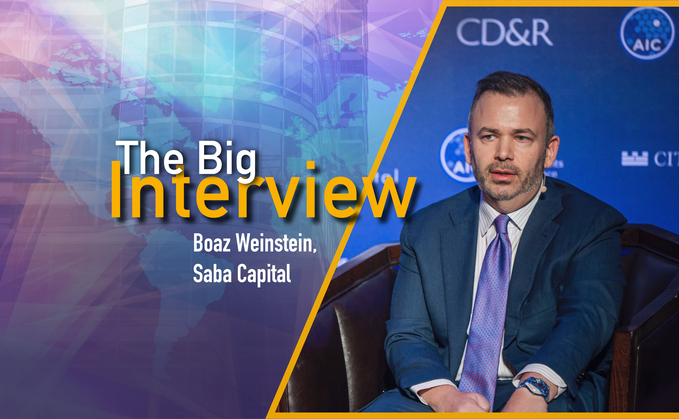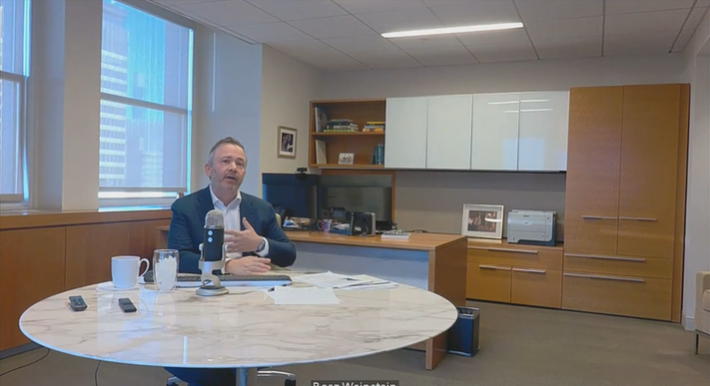
'When a manager can literally light investors' money on fire, incinerate it and still convince 99 out of 100 of them that they don't want to make 13%, then it doesn't matter if the nominee is an independent director or Mother Teresa, they won't gain investors' support.'
Saba Capital’s Boaz Weinstein is not somebody who is deterred by loss.
Having gone zero for seven in his first round of activism against the UK's investment trust sector, others in his position may have retreated.
However, Saba's founder and chief investment officer is back in London and remains resolute.
Saba 'has done a good job in shaking up the industry' but Plan B is 'a reactionary position'
He's here to meet with some of "the Miserable Seven" boards and two trusts from his new 'Plan B' agenda.
"I get things wrong constantly, but I think there's some people who emotionally can't handle it," Weinstein says over a morning espresso and croissant at a Knightsbridge hotel.
He remains steadfast in his commitment to a campaign that has ruffled the feathers of the broader investment trust space, UK press and his fellow retail investors.
Boaz's big bet
Despite targeting one of the more traditionally sleepy sides of the UK financial services industry, Weinstein's gung-ho approach, social media debates and occasional bombast quickly brought him to the attention of both the financial and national press.
Deemed 'City of London's public enemy number one', a 'Wall Street carpetbagger' and 'a blackjack raider' - the latter based on his years of blackjack success that eventually got him banned from Las Vegas' Bellagio casino - Weinstein's approach has caused waves throughout the media.
Saba saga 'should come as no surprise' and serves as 'a wakeup call to boards' no matter the outcome
The campaign launched back in December 2024 saw general meetings requisitioned at seven UK-based investment trusts where his firm was a major shareholder, with the aim to oust the incumbent boards and replace them with Saba-nominees and some independent directors.
Weinstein's fund set its sights on the trusts due to the discount to net asset value (NAV) at which they were trading, with the ambition to narrow that discount and exit.
This idea faced some criticism from analysts within the industry, who questioned the reality of exiting the trusts with private investments or illiquid positions, and many pointed to the fact that investment trusts are seen as long-term investment vehicles with the discount not necessarily indicative of manager underperformance.
All of Saba's proposals were voted down at the respective meetings and, in several cases, over 99% of non-Saba shareholders voted against its proposed changes.
"When it's 99 to one, what effectively happened was the industry closed ranks and said, 'this guy is going to do uncertain things with your future and you don't want any part of it!'" Weinstein argues across the table.
He says he was "surprised" about the level of turnout seen across the general meetings, "particularly their ability to do phone voting when it was not clear what was being said or whether it was at all balanced".
However, the Brooklyn-born hedge fund tycoon has long been a fan of a big bet and his route into and through finance is far from orthodox.
Saba lambasts investment trust 'UK boys club' ahead of crunch voting week
While a college freshman, Weinstein managed to land a summer internship at Goldman Sachs designed for graduate students, before later joining Deutsche Bank, an institution at which he would become one of its youngest ever directors, aged 27.
Amid the global financial crisis, Weinstein's Deutsche Bank desk shed $1.8bn, leading to a hasty exit. He founded Saba - the Hebrew word for ‘grandfather' - shortly afterwards.
A couple of years later, Weinstein gained further notoriety for spearing JP Morgan's so-called ‘London Whale', a trader making huge trades on credit default swaps, which saw him take the opposite side of the outsized CDS positions and cause losses of more than $6bn to JP Morgan in the process.
He therefore remains undeterred. "No, I'm not going away. I'm buying every day. I'm adding every day to my UK position," he explains.
Reflections on campaign methods
Despite failing to convince fellow investors of his plans to change their trusts' boards, Weinstein remains adamant his "big bang" approach on 18 December was the correct course of action and "has created the inroads to a very favourable solution for all shareholders".
He does, however, concede some ground.
Friday Briefing: Investment trusts do need a shake-up, but Saba is going about it the wrong way
"Maybe I asked in a way that created this storm… and maybe because we were trying to do many things at once, we didn't have the 30 people ready for the boards, which maybe we now have," he admits.
But he remains intransigent, and claims that all other methods of communication had been exhausted.
"We did speak to the [seven] boards over the past couple of years. They didn't buy back enough stock. We did tell them to, and it was not until we got to this level of stake that they actually started to care what we thought," he says.
"It is not clear to me that had I come in with a softer shoe, if I would've gotten quite as much engagement from the board as I am now getting today."

Representatives of some of the investment trusts targeted by Saba told Investment Week that they did have communication with Saba prior to the 18 December, but were under no impression that action of this nature would be taken.
For Weinstein, the failure to convince shareholders of his proposition does not come from a fault with Saba's vision, the new campaign or investor scepticism about the realities of rolling some of the more illiquid positions held by these trusts into an open-ended fund, but instead from what he sees as the inherent "clubbiness" of the industry.
"When a manager can literally light investors' money on fire, incinerate it and still convince 99 out of 100 of them that they don't want to make 13%, then it doesn't matter if the nominee is an independent director or Mother Teresa, they won't gain investors' support," he argues.
Weinstein resists a suggestion that he views himself as an underdog, but continues to hammer home his conviction that he is on the side of the retail investors who own these trusts.
"When I say we're on the side of the investors, it's because we are the investor, we're actually often 29% of investment. We are 100% aligned with investors in these trusts," he says.
"I care about the investors. Do [the boards] care? Did they spend the last three years caring?"
Campaign future
Weinstein is back in London to meet with several of the companies to reach a "a very favourable solution" and says that this time, communication is "a lot more" fruitful than expected.
The level of engagement from the boards comes as "a positive surprise" to him, and the conversations are "not about minor things".
Saba suffers seventh defeat as Edinburgh Worldwide shareholders back board continuity
"I'm going to be successful because the boards seem to care about satisfying a large shareholder's desire for investors," he says.
Although he maintains that getting an exit at or near to NAV will not be done "not just though force", Weinstein says: "If I buy it at 85p and I buy enough of it and I shake, I knock on the door loud enough, they're going to give me a 98/99p exit."
"I know what 85p is, and I know what a pound is, and I know to get there."
Saba's latest solution would see many of the positions in these trusts rolled into a larger open-ended vehicle, with a more bespoke solution alternatively offered for private and illiquid assets.
Saba Capital founder and CIO Boaz Weinstein: 'We do not need investment trusts'
This is what he's targeting with CQS Natural Resources Growth & Income; European Smaller Companies; Middlefield Canadian Income PCC and Schroder UK Mid Cap fund, and Weinstein pushes back on suggestions that the investment trust structure wouldn't neatly roll into an open-ended fund structure.
"You go into how the sausage is made, and it doesn't rely on somebody's model for Nvidia earnings next quarter. It's pretty straightforward. I'm not doing anything ‘mathy' that you need a Cambridge degree to do," he says.
The next 12 months
As he finishes his breakfast and coffee, Weinstein postulates about the lack of institutional investors purchasing investment trusts at a discount as he has done.
"What institutional player has been adding to investment trusts for the last three years? Can you name one? I can't. Retail investors collectively have been selling," he says.
Hedge funds line up short positions against Saba holdings in UK trust tussle
According to Warhorse's Investment Trusts: ‘State of the Nation' report, investment trust shares owned by retail investors grew by 42% over the five years to the end of 2024.
Due to the media attention Saba's campaign has garnered, Weinstein foresees other hedge funds and institutional players entering the market to exploit discounts.
"At the Baillie Gifford dinner they had really good sirloin and gave you really nice charts", he said, but this won't be enough for the likes of Citadel and other US hedge funds who are turning towards the UK.
"The steak is never going to taste good enough to overcome the nausea of somehow managing to lose money in a bull market," he continued.
Weinstein concludes with musings about the lessons he has taken from strategy games such as chess and blackjack that have helped him through his career in investing.
As a junior chess player, he was ranked second in the US and has previously shared clips of his speed chess games with grandmaster and world champion Magnus Carlsen. "I'm not even world class," though, he caveats, "I'm just very good".
In Weinstein's view, the combination of a delicate dance of chess piece exchange with an opponent, coupled with the hyper rationality needed to assess odds in blackjack, feeds into his activist investor mindset.
"It's just a very good training ground," he concludes.















